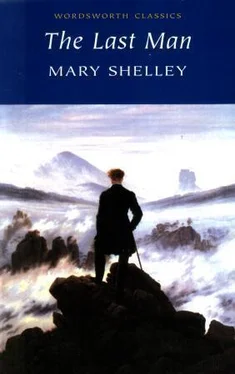Mary Shelley - The Last Man
Здесь есть возможность читать онлайн «Mary Shelley - The Last Man» весь текст электронной книги совершенно бесплатно (целиком полную версию без сокращений). В некоторых случаях можно слушать аудио, скачать через торрент в формате fb2 и присутствует краткое содержание. Год выпуска: 1826, Жанр: sf_postapocalyptic, на английском языке. Описание произведения, (предисловие) а так же отзывы посетителей доступны на портале библиотеки ЛибКат.
- Название:The Last Man
- Автор:
- Жанр:
- Год:1826
- ISBN:нет данных
- Рейтинг книги:3 / 5. Голосов: 1
-
Избранное:Добавить в избранное
- Отзывы:
-
Ваша оценка:
- 60
- 1
- 2
- 3
- 4
- 5
The Last Man: краткое содержание, описание и аннотация
Предлагаем к чтению аннотацию, описание, краткое содержание или предисловие (зависит от того, что написал сам автор книги «The Last Man»). Если вы не нашли необходимую информацию о книге — напишите в комментариях, мы постараемся отыскать её.
is Mary Shelley’s most important novel after
. With intriguing portraits of Percy Bysshe Shelley and Lord Byron, the novel offers a vision of the future that expresses a reaction against Romanticism, and demonstrates the failure of the imagination and of art to redeem the doomed characters.
From Publishers Weekly
Set in an apocalyptic future ending in the year 2100, Shelley’s 1826 novel concerns a plague that destroys almost all of humankind.
The Last Man — читать онлайн бесплатно полную книгу (весь текст) целиком
Ниже представлен текст книги, разбитый по страницам. Система сохранения места последней прочитанной страницы, позволяет с удобством читать онлайн бесплатно книгу «The Last Man», без необходимости каждый раз заново искать на чём Вы остановились. Поставьте закладку, и сможете в любой момент перейти на страницу, на которой закончили чтение.
Интервал:
Закладка:
I spoke hurriedly, but with fervour: and while with gentle violence I drew her from the portal, some thought, some recollection of past scenes of youth and happiness, made her listen and yield to me; suddenly she broke away with a piercing shriek:—“My child, my child! he has my child; my darling girl is my hostage.”
She darted from me into the passage; the gate closed between us—she was left in the fangs of this man of crime, a prisoner, still to inhale the pestilential atmosphere which adhered to his demoniac nature; the unimpeded breeze played on my cheek, the moon shone graciously upon me, my path was free. Glad to have escaped, yet melancholy in my very joy, I retrod my steps to Versailles.
Chapter XXVI
Eventful winter passed; winter, the respite of our ills. By degrees the sun, which with slant beams had before yielded the more extended reign to night, lengthened his diurnal journey, and mounted his highest throne, at once the fosterer of earth’s new beauty, and her lover. We who, like flies that congregate upon a dry rock at the ebbing of the tide, had played wantonly with time, allowing our passions, our hopes, and our mad desires to rule us, now heard the approaching roar of the ocean of destruction, and would have fled to some sheltered crevice, before the first wave broke over us. We resolved without delay, to commence our journey to Switzerland; we became eager to leave France. Under the icy vaults of the glaciers, beneath the shadow of the pines, the swinging of whose mighty branches was arrested by a load of snow; beside the streams whose intense cold proclaimed their origin to be from the slow-melting piles of congelated waters, amidst frequent storms which might purify the air, we should find health, if in truth health were not herself diseased.
We began our preparations at first with alacrity. We did not now bid adieu to our native country, to the graves of those we loved, to the flowers, and streams, and trees, which had lived beside us from infancy. Small sorrow would be ours on leaving Paris. A scene of shame, when we remembered our late contentions, and thought that we left behind a flock of miserable, deluded victims, bending under the tyranny of a selfish impostor. Small pangs should we feel in leaving the gardens, woods, and halls of the palaces of the Bourbons at Versailles, which we feared would soon be tainted by the dead, when we looked forward to valleys lovelier than any garden, to mighty forests and halls, built not for mortal majesty, but palaces of nature’s own, with the Alp of marmoreal whiteness for their walls, the sky for their roof.
Yet our spirits flagged, as the day drew near which we had fixed for our departure. Dire visions and evil auguries, if such things were, thickened around us, so that in vain might men say—
These are their reasons, they are natural, [22] Shakespeare— Julius Caesar .
we felt them to be ominous, and dreaded the future event enchained to them. That the night owl should screech before the noon-day sun, that the hard-winged bat should wheel around the bed of beauty, that muttering thunder should in early spring startle the cloudless air, that sudden and exterminating blight should fall on the tree and shrub, were unaccustomed, but physical events, less horrible than the mental creations of almighty fear. Some had sight of funeral processions, and faces all begrimed with tears, which flitted through the long avenues of the gardens, and drew aside the curtains of the sleepers at dead of night. Some heard wailing and cries in the air; a mournful chaunt would stream through the dark atmosphere, as if spirits above sang the requiem of the human race. What was there in all this, but that fear created other senses within our frames, making us see, hear, and feel what was not? What was this, but the action of diseased imaginations and childish credulity? So might it be; but what was most real, was the existence of these very fears; the staring looks of horror, the faces pale even to ghastliness, the voices struck dumb with harrowing dread, of those among us who saw and heard these things. Of this number was Adrian, who knew the delusion, yet could not cast off the clinging terror. Even ignorant infancy appeared with timorous shrieks and convulsions to acknowledge the presence of unseen powers. We must go: in change of scene, in occupation, and such security as we still hoped to find, we should discover a cure for these gathering horrors.
On mustering our company, we found them to consist of fourteen hundred souls, men, women, and children. Until now therefore, we were undiminished in numbers, except by the desertion of those who had attached themselves to the impostor-prophet, and remained behind in Paris. About fifty French joined us. Our order of march was easily arranged; the ill success which had attended our division, determined Adrian to keep all in one body. I, with an hundred men, went forward first as purveyor, taking the road of the Cote d’Or, through Auxerre, Dijon, Dole, over the Jura to Geneva. I was to make arrangements, at every ten miles, for the accommodation of such numbers as I found the town or village would receive, leaving behind a messenger with a written order, signifying how many were to be quartered there. The remainder of our tribe was then divided into bands of fifty each, every division containing eighteen men, and the remainder, consisting of women and children. Each of these was headed by an officer, who carried the roll of names, by which they were each day to be mustered. If the numbers were divided at night, in the morning those in the van waited for those in the rear. At each of the large towns before mentioned, we were all to assemble; and a conclave of the principal officers would hold council for the general weal. I went first, as I said; Adrian last. His mother, with Clara and Evelyn under her protection, remained also with him. Thus our order being determined, I departed. My plan was to go at first no further than Fontainebleau, where in a few days I should be joined by Adrian, before I took flight again further eastward.
My friend accompanied me a few miles from Versailles. He was sad; and, in a tone of unaccustomed despondency, uttered a prayer for our speedy arrival among the Alps, accompanied with an expression of vain regret that we were not already there. “In that case,” I observed, “we can quicken our march; why adhere to a plan whose dilatory proceeding you already disapprove?”
“Nay,” replied he, “it is too late now. A month ago, and we were masters of ourselves; now,—” he turned his face from me; though gathering twilight had already veiled its expression, he turned it yet more away, as he added—“a man died of the plague last night!”
He spoke in a smothered voice, then suddenly clasping his hands, he exclaimed, “Swiftly, most swiftly advances the last hour for us all; as the stars vanish before the sun, so will his near approach destroy us. I have done my best; with grasping hands and impotent strength, I have hung on the wheel of the chariot of plague; but she drags me along with it, while, like Juggernaut, she proceeds crushing out the being of all who strew the high road of life. Would that it were over—would that her procession achieved, we had all entered the tomb together!”
Tears streamed from his eyes. “Again and again,” he continued, “will the tragedy be acted; again I must hear the groans of the dying, the wailing of the survivors; again witness the pangs, which, consummating all, envelope an eternity in their evanescent existence. Why am I reserved for this? Why the tainted wether of the flock, am I not struck to earth among the first? It is hard, very hard, for one of woman born to endure all that I endure!”
Hitherto, with an undaunted spirit, and an high feeling of duty and worth, Adrian had fulfilled his self-imposed task. I had contemplated him with reverence, and a fruitless desire of imitation. I now offered a few words of encouragement and sympathy. He hid his face in his hands, and while he strove to calm himself, he ejaculated, “For a few months, yet for a few months more, let not, O God, my heart fail, or my courage be bowed down; let not sights of intolerable misery madden this half-crazed brain, or cause this frail heart to beat against its prison-bound, so that it burst. I have believed it to be my destiny to guide and rule the last of the race of man, till death extinguish my government; and to this destiny I submit.
Читать дальшеИнтервал:
Закладка:
Похожие книги на «The Last Man»
Представляем Вашему вниманию похожие книги на «The Last Man» списком для выбора. Мы отобрали схожую по названию и смыслу литературу в надежде предоставить читателям больше вариантов отыскать новые, интересные, ещё непрочитанные произведения.
Обсуждение, отзывы о книге «The Last Man» и просто собственные мнения читателей. Оставьте ваши комментарии, напишите, что Вы думаете о произведении, его смысле или главных героях. Укажите что конкретно понравилось, а что нет, и почему Вы так считаете.












